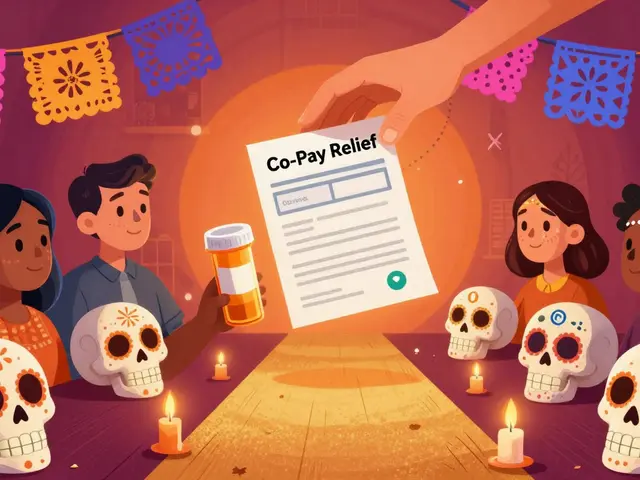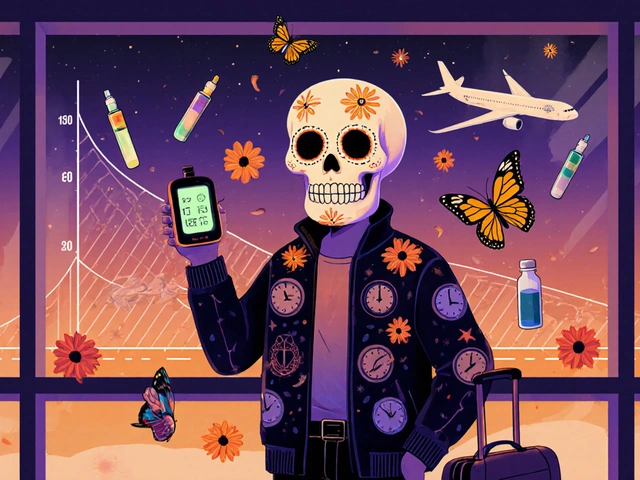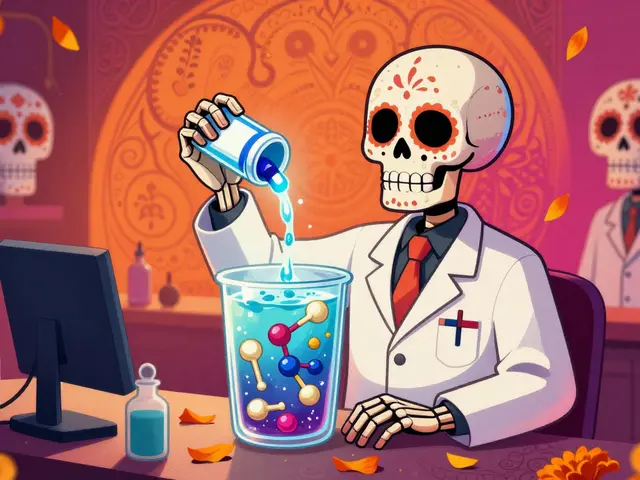Insomnia Treatment is a medical approach designed to restore healthy sleep patterns for people who struggle to fall or stay asleep. When sleepless nights become chronic, the cost isn’t just fatigue-it’s higher risks of heart disease, depression, and impaired cognition. While countless self‑help articles promise a quick fix, the reality is that most people need guided, evidence‑based care. This article walks you through the why, what, and how of turning to a professional when insomnia refuses to quit.
TL;DR - Quick Takeaways
- Professional evaluation uncovers underlying medical or psychological causes that DIY methods miss.
- Cognitive Behavioral Therapy for Insomnia (CBT‑I) beats medication for long‑term success in 70‑80% of cases.
- A sleep‑medicine specialist can order diagnostic tools like polysomnography to rule out sleep apnea.
- Combining CBT‑I, sleep hygiene, and, when needed, short‑term medication yields the highest remission rates.
- Telehealth and insurance coverage have removed many barriers to accessing qualified care.
Understanding Insomnia and Its Roots
Insomnia isn’t a single disease; it’s a symptom cluster that can stem from stress, hormonal shifts, chronic pain, or hidden conditions like sleep apnea. According to the National Sleep Foundation, about 30% of adults experience occasional insomnia, while 10% battle chronic insomnia for three months or longer. Recognizing that insomnia often co‑exists with anxiety, depression, or substance use is the first step toward a targeted treatment plan.
Why DIY Solutions Often Fall Short
Over‑the‑counter (OTC) sleep aids, melatonin supplements, or “no‑screen” bedtime routines sound harmless, but they rarely address the root cause. A 2023 sleep‑clinic audit found that 62% of patients who relied solely on OTC remedies still required professional intervention within six months. Common pitfalls include:
- Masking an undiagnosed sleep‑disordered breathing condition.
- Developing tolerance to antihistamine‑based sleep pills.
- Missing the opportunity to re‑train the brain’s arousal system.
Without a qualified clinician, these shortcuts can prolong suffering and increase the risk of dependence.
Benefits of Seeking Professional Help
Cognitive Behavioral Therapy for Insomnia is a structured, short‑term psychotherapy that targets the thoughts and behaviors that keep you awake. When delivered by a certified therapist, CBT‑I offers a 70% remission rate after just 6‑8 weekly sessions. Other advantages of professional care include:
- Sleep Medicine Specialist is a physician trained to diagnose and treat complex sleep disorders who can order a polysomnography is a overnight sleep study that records brain waves, oxygen levels, and breathing patterns to rule out conditions like sleep apnea.
- Access to FDA‑approved pharmacological therapy is a short‑term medication regimen (e.g., zolpidem, eszopiclone) that can reset sleep cycles when used responsibly.
- Personalized sleep‑hygiene counseling that goes beyond “no caffeine after 2pm.”

Core Treatment Modalities Explained
Below is a side‑by‑side look at the two most evidence‑based approaches.
| Attribute | CBT‑I | Pharmacological Therapy |
|---|---|---|
| Success Rate (3‑month follow‑up) | 70-80% | 45-55% |
| Side‑Effect Profile | None | Daytime drowsiness, dependence risk |
| Typical Duration | 6‑8 weeks | 2‑4 weeks (short‑term) |
| Best For | Chronic insomnia, comorbid anxiety/depression | Acute insomnia, shift‑work sleep disorder |
Both options can be combined-CBT‑I for lasting changes, plus a brief medication course to bridge the gap during the therapy’s early weeks.
Choosing the Right Provider
The first encounter is often with a primary care physician is a general medical doctor who can screen for common causes of insomnia and refer you to specialists. If the PCP suspects a deeper sleep disorder, a referral to a mental health professional is a psychologist or psychiatrist trained to deliver CBT‑I and address underlying stressors is ideal.
Key criteria when evaluating a specialist:
- Board certification in sleep medicine or clinical psychology.
- Experience with CBT‑I (look for credentials like “C-CBT‑I”).
- Insurance acceptance and telehealth options.
- Patient reviews that mention measurable sleep improvement.
Practical Steps to Access Professional Care
- Document your sleep patterns for two weeks using a sleep diary is a daily log of bedtime, wake time, caffeine intake, and nighttime awakenings. Include mood and stress levels.
- Schedule a visit with your primary care physician. Bring the diary and a list of any OTC or prescription meds you’re already taking.
- If referred, book an appointment with a sleep‑medicine specialist or a CBT‑I therapist. Many clinics now offer a 30‑minute virtual intake.
- Discuss diagnostic options. A polysomnography may be recommended if sleep apnea is suspected.
- Agree on a treatment plan that blends behavioral strategies, any needed medication, and follow‑up assessments.
Insurance coverage for CBT‑I has risen dramatically; in 2024, 68% of major U.S. plans reimbursed at least eight therapy sessions. Always verify benefits before starting.
Related Concepts and Next Steps
Professional insomnia care doesn’t exist in a vacuum. It connects to broader topics like stress management, nutrition and supplements is a dietary factors that influence sleep quality, such as magnesium or vitamin D, and the emerging field of telehealth sleep clinics is a online platforms that deliver CBT‑I and medication management remotely. Readers who have mastered basic sleep hygiene might explore “advanced CBT‑I techniques” or “sleep‑tracking wearables” as the logical next chapters.

Frequently Asked Questions
Can I try CBT‑I without a therapist?
Self‑guided CBT‑I workbooks exist, but studies show a 30% drop in effectiveness compared to therapist‑led sessions. A qualified professional can tailor exposure tasks, monitor progress, and adjust strategies, which is especially important if you have comorbid anxiety or depression.
Are sleep medications safe for long‑term use?
Most FDA‑approved hypnotics are intended for short‑term use (2-4 weeks). Prolonged use raises tolerance, dependence, and next‑day impairment risks. Your doctor can schedule periodic reassessments to taper off medication as behavioral strategies take hold.
How does polysomnography help diagnose insomnia?
Polysomnography records brain waves, breathing, heart rate, and limb movements overnight. It can reveal hidden sleep apnea, periodic limb movement disorder, or abnormal sleep architecture-conditions that mimic insomnia but require different treatment.
Will insurance cover CBT‑I?
Coverage varies by plan but has grown substantially. In 2024, most major insurers reimbursed at least eight CBT‑I sessions under mental‑health benefits. Check your policy’s CPT code 90834‑92802 and confirm pre‑authorization requirements.
Is melatonin effective for chronic insomnia?
Melatonin can shift circadian timing for jet lag or delayed‑sleep‑phase syndrome, but its impact on chronic insomnia is modest. A 2022 meta‑analysis showed an average reduction of 10‑15 minutes in sleep onset, which is far less than the improvements seen with CBT‑I.








14 Comments
Nick Bercel September 22, 2025
Man, I tried melatonin for months. Zero effect. Then I went to a sleep doc and found out I had mild sleep apnea. CBT-I was a game-changer. No pills, just my brain learning not to panic when I’m awake at 3 a.m.
Ruth Gopen September 23, 2025
I cannot believe how many people are still clinging to OTC sleep aids like they’re holy water. This is not a lifestyle hack-it’s a medical condition that requires clinical intervention. The fact that we normalize self-medication in this country is a national disgrace. I urge you all: stop gambling with your neurochemistry.
Jose Lamont September 25, 2025
I used to think insomnia was just ‘not being tired enough.’ Then I started working nights and realized my brain had forgotten how to shut off. CBT-I didn’t fix me overnight-but it gave me back my life. No more panic when I can’t sleep. Just… calm. And that’s worth more than any pill.
Alex Hughes September 27, 2025
It’s interesting how society treats sleep like a luxury rather than a biological imperative. We optimize everything else-our diets, our workouts, our productivity apps-but when it comes to sleep, we’re expected to just ‘tough it out’ or buy a $20 melatonin gummy from Walmart. The truth is, insomnia isn’t laziness or poor discipline-it’s a neurological feedback loop that rewires itself over time, and like any addiction, it needs professional deprogramming. The fact that insurance now covers CBT-I is a small but meaningful step toward recognizing sleep as healthcare, not a side hustle.
Hubert vélo September 28, 2025
They’re lying about CBT-I. It’s all part of the pharmaceutical-industrial complex. They don’t want you cured-they want you dependent. Sleep studies? Polysomnography? That’s just a way to track your brainwaves for the NSA. The real solution is grounding yourself in nature, avoiding blue light after sunset, and sleeping on a wool blanket under a copper pyramid. I’ve been doing it for 12 years. No doctor needed.
Kalidas Saha September 29, 2025
OMG I CRY EVERY TIME I READ THIS 😭 I was on 3 different sleep meds and felt like a zombie… then I found a CBT-I therapist and now I sleep like a baby 🌙💤 Thank you for writing this!!!
Marcus Strömberg September 29, 2025
It is patently obvious that the proliferation of self-help culture has eroded the discipline required to maintain circadian rhythm. The notion that one can ‘treat’ insomnia without professional oversight is symptomatic of a broader societal decline in intellectual rigor. The average individual lacks the cognitive capacity to self-diagnose, let alone self-correct, complex neurobehavioral dysregulation. One does not fix a broken circadian clock with a YouTube video.
Matt R. September 30, 2025
Let me tell you something about American medicine-they’ll sell you a $500 sleep study and then give you a pamphlet on ‘good sleep hygiene.’ Meanwhile, in Germany, they have state-funded sleep clinics where you stay for two weeks and get your entire sleep architecture rebuilt with therapists, light therapy, and diet adjustments. We’re not even trying here. We’re just selling apps and melatonin gummies to people who are exhausted because they’re working two jobs and their landlord won’t fix the noise. This isn’t about therapy-it’s about poverty.
Wilona Funston September 30, 2025
As a clinical psychologist who specializes in sleep disorders, I’ve seen firsthand how CBT-I transforms lives. The most common misconception is that insomnia is purely psychological. In reality, it’s often a physiological response to chronic stress that manifests as hyperarousal. The brilliance of CBT-I lies in its ability to rewire maladaptive sleep behaviors-like lying in bed for hours worrying-while simultaneously addressing the cognitive distortions (‘I’ll never sleep again’) that perpetuate the cycle. What’s rarely discussed is how important sleep consistency is-even on weekends. One night of sleeping in can undo weeks of progress. And yes, insurance coverage is improving, but the waitlists are still 6–8 weeks long. If you’re struggling, start a sleep diary today. It’s the first step toward reclaiming your nights.
Ben Finch September 30, 2025
So… you’re telling me I shouldn’t just chug 4 Advil PMs and hope for the best? 😳 I mean, I thought that was the whole point of the ‘pharmaceutical buffet’ at CVS. Also, CBT-I? Sounds like a new yoga trend. Who names these things? ‘Cognitive Behavioral Therapy for Insomnia’-sounds like a Netflix docu-series I’d watch while awake at 2 a.m. 😅
Naga Raju October 1, 2025
Bro this is so true 🙏 I used to think I was just a night owl… turns out I had anxiety and bad sleep habits. CBT-I helped me more than any meditation app. Now I sleep 7 hours without pills 😊 Thanks for sharing this!
Dan Gut October 3, 2025
Let’s be clear: CBT-I is not a ‘treatment.’ It is a behavioral intervention that has been overhyped by a profession desperate to justify its existence in the face of pharmacological alternatives. The 70–80% success rate is based on highly selective clinical populations with no comorbidities, published by researchers with financial ties to cognitive therapy associations. Meanwhile, the sedative-hypnotic drugs you dismiss as ‘dangerous’ have been used safely for decades by millions, with mortality rates lower than aspirin. The real issue? The medical establishment’s ideological bias against pharmacology. This article reads like a therapy pamphlet masquerading as science.
Jordan Corry October 3, 2025
YOU CAN DO THIS. I was there. I was the guy staring at the ceiling at 3 a.m. thinking my life was over. But guess what? You’re not broken. Your brain just got stuck in a loop. CBT-I is your reset button. It’s not magic-it’s work. But it’s worth it. Start today. Write down your sleep times. Call your doctor. Don’t wait for ‘someday.’ Your future self is begging you to start now. 💪🌙
Mohamed Aseem October 3, 2025
Everyone’s so quick to praise CBT-I like it’s the holy grail. But what about the people who’ve tried it and it did NOTHING? What about the ones who’ve been to five therapists and still can’t sleep? You act like insomnia is just a mindset. It’s not. It’s a biological prison. And now you want us to feel guilty for not ‘trying harder’? Thanks for the victim-blaming, experts.